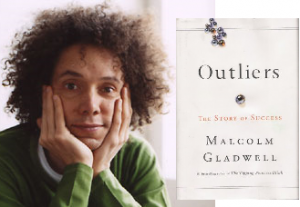 Are you an Outlier? I know I’m not. In fact I’m very average in every way, apart from the fact that I’m not. Average that is. Because there simply isn’t an “average” person. There is literally far too many permutations of knowledge and beliefs across society for there to actually be an average person. Perhaps that’s why we spend so much time trying to fit in, because we effectively can’t really ever.
Are you an Outlier? I know I’m not. In fact I’m very average in every way, apart from the fact that I’m not. Average that is. Because there simply isn’t an “average” person. There is literally far too many permutations of knowledge and beliefs across society for there to actually be an average person. Perhaps that’s why we spend so much time trying to fit in, because we effectively can’t really ever.
Anyway, I digress. An Outlier, as defined in the book Outliers, The Story of Success by Malcolm Gladwell is someone who is simply outstanding in his or her particular field. So, definitely not me then. Or, not yet anyway.
The premise of Outliers is that people are only great at something because of a complex set of inherited circumstances, societal phases and lucky breaks, some earned and some not. And almost always the deciding factor is not so much how much of a genius a person is, or how much talent they have, but how long they stick at something.
Take the Beatles for instance. Once upon a time they were a “garage band” from Liverpool. They had some raw talent and big ambition which is the same tale as many, many other bands in the history of the music. What made the Beatles so great was a lucky break followed by hard work. They were asked to play in Hamburg, Germany.
In those days what sets they played in their home town were usually an hour at most on stage maybe a couple of times in a weekend. Hamburg was a different kettle of fish altogether. The club owners wanted music all the time so the band were expected to play sets of eight hours. Every night they played, they played for eight hours straight. And they went back year after year. Sure the went mostly for the beer and the sex, they were young guys in the sixties after all, but at the same time they got lots and lots of practice. They became very, very good. And the rest is history.
Practice then is the best indicator of success. I’ve actually read that before, in a book called Talent Is Overrated. The only difference between virtuoso musicians and not quite virtuoso musicians is how much they practice. Those who practice more get better.
Outliers talks about other things that impact on outstanding success, such as what appear to be random circumstances but, when combined with lots of practice, generate outstanding success. For instance, Bill Gates. When he was young he just happened to go to a highschool that had a computer. And consider, in that particular day and age computers were the size of rooms and the people who knew how to use them were few and far between. The advent of time-sharing terminals was cutting edge technology and Gates just happened to end up at one of the very few schools in the world that had one. Gates had the opportunity and he seized it and put in the practice. The rest is history.
There are an amazing number of things that Gladwell identified in Outliers as having an effect on success. Things from when in the year you were born, the year that you were born (did you know Bill Gates, Steve Jobs, Paul Allen, Eric Schmidt and Bill Joy, all computing pioneers and seriously wealthy men, were all born between 1953 and 1955. What about John D Rockefeller, JP Morgan and Andrew Carnegie; all born between 1835 – 1839), who you parents were and the sort of work and background they had, the culture you were born into and even the things you learnt whilst you were growing up.
Got to say, after reading the book I felt really frustrated. Almost all of the successful people that Gladwell discussed became successful from a combination of hard work, where they came from and a series of lucky breaks. I have no issue with the hard work, but where I come from I have no control over. Neither do I have any control over the breaks I get and sometimes I really wish I could just score one!
But maybe I have. Maybe I’ve had a series of breaks that have led me right here and from here something amazing will happen and I’ll suddenly build the business I want. Or maybe I’m practicing, honing my craft, before taking that crucial step that will unlock massive success.
I don’t have any ambition to be Bill Gates or the Beatles or John D Rockefeller; I do want to work for myself making $100,000’s every year at a craft I thoroughly enjoy and can do from anywhere in the world. And maybe I’ve had the breaks already that will get me there.
The moral of the story: whatever you want to succeed at – keep practicing. If you keep going for 10,000 hours you will be an expert, nay, the expert, in whatever your field. That’s an hour a day for 27 years. At two hours a day it will be 13 1/2 years. At three hours ….
Lisa

Leave a Reply